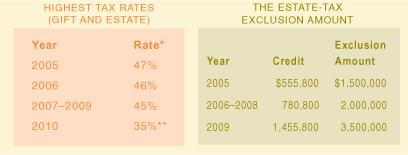| |
|
|
... |
|
Term Life Insurance by Top
Rated Companies
More term companies
equals the best opportunity to obtain the lowest term quote!
Offering the Largest Selection of
Top-Rated Companies Instantly!
Why is this important?
Personalized
Tele-Application for All Companies, Right Over the
Phone!
For the serious shopper who would like a seasoned
professional to assist them-
"how term life insurance
works", "return of premium term life insurance",
"no exam term life insurance" and "what is term life
insurance" will be explained on this page.
 |
Federal Estate Tax Planning
|
|
|
Note: In all cases, when implementing an estate plan, legal advice is a
must!
Federal Estate Tax Planning is a must or, the government may take a large part of
your estate. Figuring estate tax
is complex, and the phase out of the tax through decreases in the
top estate-tax rate
and increases in the estate-tax credit makes the computation even
more complicated. However, to effectively plan your estate, you need
at least a basic understanding of
how the tax works.
Every individual is allowed a credit that permits a certain
amount in assets to pass free of estate and gift tax. So, if
your total taxable estate and lifetime gifts are less than
or equal to the applicable credit exclusion amount (see
below), no federal estate tax will be due.
(The gift-tax exclusion amount is $1 million.) To
illustrate: In 2007, the credit will offset $780,800 in
estate taxes. If you die in 2007 with a
taxable estate
of $2.1 million, having made no taxable gifts during life,
the tentative estate tax will be $825,800. However, assuming
your estate has no adjustments other than the estate-tax
credit, the actual tax will be $45,000 ($825,800 –
$780,800).
ESTATE VALUE
For a general idea of how much tax, if any, will be due on
your estate, estimate the current value of your estate
worksheet. Then subtract allowable deductions. These
deductions may include, but aren’t limited to:
|
|
• |
Estate administration fees; |
|
|
|
• |
Funeral expenses; |
|
|
|
• |
Valid debts, such as your mortgage and unpaid property
or income taxes; |
|
|
|
• |
Transfers for public, charitable, and religious uses;
and |
|
|
|
• |
Bequests to your surviving spouse (see
Unlimited Marital Deduction,
discussed in next section).
|
|
Next, add in the value of any taxable lifetime gifts you have made.
Check this amount against our tax
table to get an idea of the amount of tax your estate would owe if
you should die in 2007–2008.
TAX RATES AND EXCLUSION AMOUNT

The generation-skipping transfer tax is assessed at a flat
rate equal to the top gift- and estate-tax rate.
**Gift tax only. Estate and generation-skipping transfer taxes
(discussed later) are repealed in 2010.
THE GENERATION-SKIPPING TRANSFER TAX
Another possible concern for the near future is the
generation-skipping transfer (GST) tax. This tax
could come into play if you want to leave your assets in a way that
will benefit your grandchildren or
other persons more than a generation younger than you. The GST tax
rate is steep — equal to the highest federal estate-tax rate (see
the
Tax Rates and Exclusion Amount
table). GST tax, which is
being phased out on the same schedule as the estate tax, must be
paid
in addition to
estate and
gift tax.
The purpose of
the GST tax is to prevent families from sidestepping a generation’s
worth of estate
taxes by transferring assets to grandchildren, rather than to
children. GST tax applies both to indirect transfers made in trust
(for example, a trust that benefits your child first and, then, your
grandchild after your child’s death) and to “direct skips,”
transfers made directly from you or from a trust you create to a
grandchild or another person two or more generations below your
generation.
A cumulative
$1.5 million GST tax exemption gives you leeway to transfer up to
that amount to your grandchildren or others free of the GST tax. If
you and your spouse agree to split gifts, together you can give your
grandchildren up to $3 million without incurring the GST tax. This
exemption tracks the
estate-tax exclusion amount (see the
Tax Rates and Exclusion Amount
Table).
The GST tax
does not apply to direct transfers and certain transfers from trusts
you make to a
grandchild whose parent — your child — is deceased. GST-tax-free
transfers to “collateral” heirs
(such as a grandniece or grandnephew) may also be possible under
limited circumstances.
Another possible concern for the near future is the
generation-skipping transfer (GST) tax. This tax
could come into play if you want to leave your assets in a way that
will benefit your grandchildren or
other persons more than a generation younger than you. The GST tax
rate is steep — equal to the highest federal estate-tax rate (see
the
Tax Rates and Exclusion Amount
table). GST tax, which is
being phased out on the same schedule as the estate tax, must be
paid
in addition to
estate and
gift tax.
The purpose of
the GST tax is to prevent families from sidestepping a generation’s
worth of estate
taxes by transferring assets to grandchildren, rather than to
children. GST tax applies both to indirect transfers made in trust
(for example, a trust that benefits your child first and, then, your
grandchild after your child’s death) and to “direct skips,”
transfers made directly from you or from a trust you create to a
grandchild or another person two or more generations below your
generation.
A cumulative
$1.5 million GST tax exemption gives you leeway to transfer up to
that amount to your grandchildren or others free of the GST tax. If
you and your spouse agree to split gifts, together you
can give your grandchildren up to $3 million without incurring the
GST tax. This exemption tracks the estate-tax exclusion amount (see
the Tax Rates and
Exclusion Amount
Table).
The GST tax
does not apply to direct transfers and certain transfers from trusts
you make to a
grandchild whose parent — your child — is deceased. GST-tax-free
transfers to “collateral” heirs
(such as a grandniece or grandnephew) may also be possible under
limited circumstances.
Currently, capital gains taxes are more of a financial planning
consideration than an estate-planning
one. But this is likely to change in the future. With the
estate-tax repeal comes a change in the way
capital gain on inherited property is taxed.
You pay
capital gains tax on gains realized when you sell property that
has increased in value while you’ve owned it. Your gain (or
loss) for capital gains tax purposes is usually determined by
using your “basis” in the property. Basis generally refers to
the amount you paid to acquire the property, plus or minus
various adjustments that may be required after acquisition (for
items such as depreciation, reinvested dividends, and the cost
of capital improvements). Your gain is the value of the property
in excess of your basis.
When you
give someone assets during your lifetime, your basis (or the
fair market value of the assets,
if less) on the gift date is carried over and becomes the
recipient’s basis. If the recipient later sells the
gift assets, he or she is liable for capital gains tax on the
assets’ appreciation both
before
and after
you made the gift.
Inherited
property is treated differently. It usually receives a “step-up”
in basis to its fair market value at the time of the owner’s
death. So, if you leave property to your son and he later sells
it, he’ll be responsible for capital gains tax only on the
appreciation generated after your death. However, as of 2010,
new rules apply for determining inherited property’s basis. The
new rules limit basis step-ups
and, in many cases, will result in significantly higher capital
gains taxes on the sale of inherited property.
In 2010,
each estate generally will be able to increase the basis of
property transferred only up to a
total of $1.3 million. The basis of property transferred to a
surviving spouse may be increased by an additional $3 million
for a total of $4.3 million. These amounts will be adjusted
annually for inflation.
Some
property — tax-deferred money in retirement plans and Individual
Retirement Accounts, for example — won’t be eligible for even
the limited step-up. Any property that isn’t allocated a basis
step-up will pass to your heirs and beneficiaries with a
“carryover” basis equal to the
lesser
of (1) your adjusted basis in the property or (2) the property’s
fair market value on the date of death.
COMPARING CAPITAL GAINS TREATMENT
Earl
owns closely held stock that he bought at $10 a share. When he
dies in 2010, his daughter Gretchen inherits the stock, now
valued at $500 a share. Shortly after his death, Gretchen sells
the stock for $500 a share. Under the new carryover basis rules,
Gretchen will have a capital gains tax bill of $98 on each share
sold (20% capital gains tax rate × $490 appreciation). If Earl
had died before 2010, Gretchen would have owed no capital gains
tax because her basis in the stock would have been stepped-up to
its value at Earl's death — $500 a share — and she wouldn't have
realized any capital gain on the sale.
NEXT
Author’s note:
The intent of this article by termlifeamerica.com is to
inform and motivate the general public into action.
One should consider only a qualified practicing legal individual or
entity, in the state in which you reside, to establish properly
drawn documents of this type.
SEE
Estate Planning Brochure
Related Topics:
|
|
|
|










